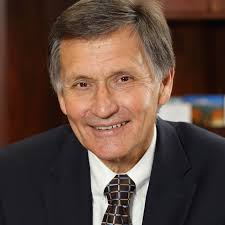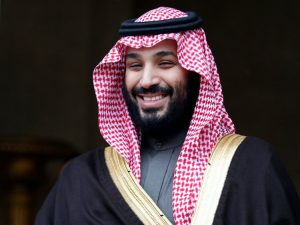
If you were given the opportunity of an audience with the leadership of another country, would you be prepared to bear witness to the Gospel?
Wayne Pederson recently joined Carmen to share about his trip to meet with the Crown Prince of Saudi Arabia that took place on the anniversary of the September 11 tragedy.
Wayne Pederson is currently serving as an ambassador with Far East Broadcasting Company. He has also served as president of Reach Beyond, vice president for Radio at Moody, executive vice president for radio at Northwestern Radio, and president of the National Religious Broadcasters.
Transcript (begins at 22:30)
Carmen LaBerge: Two weeks ago, on the eve of September the 11th many of us became aware that several evangelical Christians were having an audience in the Saudi kingdom of Saudi Arabia and one of those individuals is Wayne Pederson, and he is joining me now.
Carmen LaBerge: Wayne, welcome to Mornings with Carmen.
Wayne Pederson: Hi, good morning, Carmen. Good to hear your voice again. Good to be on with you.
Carmen LaBerge: It’s great to have you with us. Let me remind folks that Wayne is a member of the board of directors of the National Religious Broadcasters. Full disclosure here, I’m a member of the NRB. Wayne is on the board of the Evangelical Council for Financial Accountability, you know them as ECFA. He’s the former president and CEO of the NRB. He’s also former president of Reach Beyond, an international Christian radio ministry and he’s a member of the board of directors of the Joshua Fund. The Joshua Fund was started by Joel and Lynn Rosenberg and they were the hosts of this particular delegation, which also included Johnny Moore and Larry Ross, Ambassador John Kenneth Blackwell, Michael Little, and a number of folks who journeyed together to Saudi Arabia and as a part of that, had audience with the crown Prince. Let’s just talk for a moment about that experience.
Wayne Pederson: Well, it’s amazing. You know, I grew up on a grain and dairy farm in northern Minnesota and to meet with the Crown Prince of Saudi Arabia is pretty tall corn for us. But this is our second visit with South Arabian Crown Prince Mohammad Bin Salman. And the first visit was amazing as he opened up to social reforms going on in the country for more freedoms for women, more freedoms for Christians and Jews. And he invited us back a second time. And it’s a time for … these are friendly, diplomatic sessions. But this is the first time for centuries or first time ever that a group of evangelical Christians has been invited to meet with the top leadership of Saudi Arabia. So it’s truly amazing and unprecedented and we see this as doors that God is opening for a greater understanding, greater trust and greater opportunities to understand the Arabian culture, but also for them to understand what we, as evangelical believers, believe.
Carmen LaBerge: Now, Wayne, you know they’re going to be people listening right now who are going to be saying to themselves, ‘Saudi Arabia is an Islamic state. Saudi Arabia is governed by a constitution that is the Quran. They are governed by Sharia law. They are some of the worst human rights violators in all the world.’ There are going to be people listening right now who are going to immediately ask the question, “Was there an opportunity to share the Gospel, did the evangelicals in the room share the Gospel?” And I’m going to let you answer that question and then we can talk more about what these opportunities are really designed to achieve.

Wayne Pederson: Well, and Carmen, what you have cited is part of the history of Saudi Arabia, there’s no question about that, but it’s changing and it’s changing dramatically. Recently the King of Saudi Arabia called together 1200 Muslim scholars. They created a charter of Mecca, which basically says that we are going to be more tolerant. We’re fighting extremism and terrorism. We’re going to build relationships with Israel and with Jews. We’re tolerant of other religions. Christians are welcomed here to continue to worship in their homes without interference from the government. So there is no doubt that Saudi Arabia has a long ways to go, but also there’s no question, they’ve come a long ways. And when they invite evangelicals in, this is an opportunity to create dialogue.
Wayne Pederson: And in direct answer to your question, we did have opportunity to share our faith. We did have opportunities to share this is what we, as evangelicals, believe that Jesus is the son of God. He came to earth live the perfect life that we can live. He died on the cross to pay for our sins. He rose again from the dead so that we could have eternal life. And so we clearly shared that. We were able to pray for the country in the name of Jesus, and that was received with actually quite great emotion on the part of the Crown Prince. And we also had an opportunity to plead for political prisoners, religious prisoners in the country, asked for their release and also to plead for religious freedom, greater religious freedom, so that Christians can worship not just behind their gates, and their homes, but worship openly in the culture. And we were assured that with increased social reforms that day is coming but not now.
Carmen LaBerge: So I think when we talk about laying the groundwork of relationships, that’s part of what I hear you talking about. Because relationships are really formed and established over time and there’s an acknowledgement that we are on somebody else’s turf. We’re in somebody else’s house and their house rules do – at some level – govern how far we go.
I think of Paul in front of Agrippa and he’s in chains and part of the power of his testimony or his opportunity to bear the kind of witness that he bore is simply because he’s in chains. It’s really obvious that who is in a position of power and authority in that moment in terms of worldly power. And so I’m cognizant of that as I ask these questions. But the reason that I’m asking, Wayne, is these are the questions that evangelicals across the country are going to think to ask of this meeting, of this event.
One of the questions that I’m hearing is why September 11th? Like that just seems like salt in a wound that’s not yet healed here in this country, recognizing that 15 of the 19 terrorists on September 11th were Saudis.
Wayne Pederson: Yeah, well Carmen, we picked that date intentionally using that as an opportunity to talk with their top government officials about this. And without revealing too much of an off-the-record meeting, it was acknowledged that the nation at that time, it was a turning point for Saudi Arabia to see the terrible results of extremism and terrorism and see how it was affecting and killing many, many lives. And it was a wake up call for the leadership there that things have to change and that we’re going to take on the terrorist and we’re no longer going to tolerate terrorism and extremism. And we want to go back to what Islam was 40 years ago when it was not known as a terroristic extremist religion.
So being there on that date was a statement to them and a statement to the world that things are changing. And so it was interesting to hear the reaction of the officials when we talked about this, because it’s a new day. That was then, this is now. And recognizing, they recognize internally they still have a long ways to go in addressing terrorism, but they are uniting with other Saudi Arabia nations, Muslim nations, like Jordan and United Arab Emirates and Egypt to fight terrorism and make sure that that doesn’t happen again.
Carmen LaBerge: All right. I’m going to continue my conversation with Wayne Peterson in just a moment. He and I are talking about this really extraordinary opportunity that a handful of evangelicals had to visit the Kingdom of Saudi Arabia and, and, and have an audience with the Crown Prince. We’re going to continue this conversation on Mornings with Carmen in just a moment. We’ll be right back.
(break)
Carmen LaBerge: Continuing my conversation with Wayne Peterson. He is a colleague in radio ministry. He is a member of the board of directors of the National Religious Broadcasters and the Evangelical Council for Financial Accountability, two organizations that I certainly highly respect and appreciate. He has participated in two trips to Saudi Arabia, the most recent the week of September 11th, just a couple of weeks ago.
Carmen LaBerge: Wayne, one of the things that I find extraordinary about the agenda of the event is some of the language that is captured here. And I want to I want to use it as an opportunity to talk about all of the things that happen that aren’t on the agenda. Because I think that when people think about this kind of trip and they might hear that you had meetings with the US Ambassador to Saudi Arabia or the General Secretary of the Muslim World League or Saudi Arabia’s Ambassador to Yemen or

members of the Saudi military or I mean on and on and on, these advisors to his majesty, King Solomon. And then you did meet with the Crown Prince.
Carmen LaBerge: When people see this and in between, if they look carefully, they’ll see these words “motorcade to …, motorcade to …, motorcade to … Most of us have never been in a motorcade of any kind. So as I was reading this, two thoughts came to mind, and so this is the question that I want to ask. The fact that Saudi Arabia welcomed and showed generous hospitality to people who are recognized globally as evangelical Christians who sit with the President of the United States and talk about issues and concerns like religious liberty and religious freedom and what’s happening around the globe in terms of Christian persecution. People who have that audience with the US President are having this audience with the Crown Prince of Saudi Arabia.
Carmen LaBerge: I am wondering what people, regular people and people who you encountered at the hotel when the motorcade arrives or leaves. Those are the people who I feel like there’s real like cultural impact with, because they see their country hosting recognizable evangelical figures.
Wayne Pederson: Well, and it hasn’t just been Saudi Arabia either, second visit to Saudi Arabia. But our group has had similar experiences in Egypt with the President el-Sisi of Egypt who was making similar dramatic social reforms and acceptance of Christians and making it clear that Christians are welcome here in Egypt and there’ll be a represented and protected. A similar experience with King Abdullah of Jordan, who has also welcomed evangelical delegation there. And our team has sat with the King and his cabinet explaining biblical prophecy and what evangelicals believe. United Arab Emirates as well, actually the crown Prince of United Arab Emirates was born in a missionary hospital years ago, and he points that with pride. So we see that there are holes in the wall and I see God poking holes in this wall where we can sit down and relate to what many would say is the enemy.
Wayne Pederson: And in many ways, historically they have been. But an ability to build a relationship. And I think of not only Paul the Apostle, but I think of Joseph that worked under one of the most corrupt Egypt pharaohs in history. I think of Obadiah who worked under wicked King Ahab. You know, I think of others that throughout history. Look at Daniel serving under a very wicked Babylonian and then later the mean Persian Kings. So this was not unusual for evangelical, for followers of Jehovah, followers of Jesus to be able to operate as strong believers in God, Jehovah, and having an opportunity to live a God honoring life, while serving under very hostile governments.
Wayne Pederson: So when God opens the door, how do you not go in and come in as representative of Jesus, the son of God, and to share the love of God. And we saw it not only at the highest level, but on the waiters in the restaurants and on the cab drivers and on those that waited on us, a great friendliness and openness. So it’s not just on the high level. Obviously we were treated very specially and given high security, but at the same time we’re welcomed with some of the most beautiful hospitality you could expect.
Carmen LaBerge: So one final question. And again, Wayne, thank you so much for joining us today. It’s a joy to talk with you. My last question is about Yemen. Real genuine humanitarian crisis, a proxy war situation. Saudi Arabia is heavily involved. Talk with us about Yemen.
Wayne Pederson: Well, yeah, and we had quite a briefing from the military about Yemen and one of the problems is that the minority terrorists are being funded by Iran. The bombs that were sent into Saudi Arabia on the oil refineries and on some of the ships are Iranian-made bombs and rockets that the [inaudible] are using against Saudi Arabia. So when Saudi Arabia goes in and does attacks, it’s against the extremists there. The bulk of Yemeni residents are suffering terribly at the hands of the rebels and the extremists that are existing there and being funded by Iran. So the war of Saudi Arabia in Yemen is really against Iran and the ISIS and the terrorists there that are funding and supplying weaponry to the Yemeni extremists. And so it’s a bit different from what’s being portrayed in media as a war against Yemen, which is actually a war against Iran.
Carmen LaBerge: So, yeah, I think that we could have a whole conversation about Iran, but we don’t have time today. So Wayne Peterson, thank you so much for joining us. Thank you for giving us a window into your experience on this trip. May everyone today, including Wayne and Carmen, be reliable witnesses to our Lord and savior Jesus Christ as we operate as the ambassadors of the King and the kingdom in the midst of kingdoms of this world. We’ll be right back.
Carmen LaBerge: So would you accept the invitation if invited? Would you accept the invitation, if invited to, I don’t know, the home of the strip club owner? This is maybe bringing it right, like bring it home, and ask yourself, is there an invitation that I would reject in terms of hospitality where I might have the opportunity to bear positive public witness to who Jesus Christ is, what he has done in my own life and what he is doing in the world? So how am I today, going to operate as an ambassador of the kingdom of heaven in the midst of the kingdoms of this world? Sometimes real Kings in real kingdoms like Saudi Arabia and its Crown Prince. Sometimes little fiefdoms in my own neighborhood, right? So that’s our obligation and our opportunity today. Let’s let the Holy spirit be the operating system in our hearts and minds, saturating our lives with the scriptures in order that when the world presses in, what comes out of us would be the very word of the living God. To his honor and glory, we live this day and always. Have a great day and God bless.


